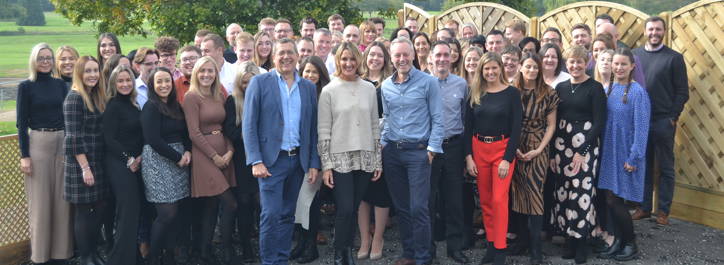Why ESG should be top of all leaders’ agendas
 Bridget McIntyre, Founder of coaching company, Alitus, spoke at our Best Employers’ conference on how ESG strategies can transform organisations by creating sustainable change. We’ve worked with Bridget over many years, and she’s been a long-time ambassador for Pure and our programmes.
Bridget McIntyre, Founder of coaching company, Alitus, spoke at our Best Employers’ conference on how ESG strategies can transform organisations by creating sustainable change. We’ve worked with Bridget over many years, and she’s been a long-time ambassador for Pure and our programmes.
When Bridget launched the Perducto programme, we knew that our regions’ leaders and Best Employers would want to know more. Lynn Walters, our Executive Director, sat down with Bridget and Sadie Lofthouse, Alitus’ Head of Corporate Training and Development, to find out more.
Why is ESG important?
‘ESG has the potential to create powerful organisations and positive societal impact,’ Bridget tells us. ‘That’s because, apart from reducing the negative environmental impacts of business, it also has lots of benefits for those prepared to embrace it. It can enhance your reputation and brand value, bring positive attention from customers and the public, and differentiate you from your competitors.’
ESG is also becoming increasingly important to investors. ‘Lots of banks are asking to understand companies’ ESG policies before they do business with them,’ Bridget says. ‘A successful ESG strategy means you might find yourself with a wider pool of investors to choose from, including those focused on sustainable and impact investing.’ In fact, according to Ernst & Young’s 2022 Global Private Equity Survey, investors are increasingly interested in sustainable investing options, with 39% saying they invest in ESG-related products.
Embedding ESG in your business can boost your recruitment too. ‘When talented younger people are choosing where to build a career, they prioritise organisations that share the same values as their own,’ Sadie says. ‘And a lot of that will come down to ESG policy and performance.’ This can also help you hold on to talented employees for longer, as employees are more likely to be engaged and motivated when they feel their work is having a positive impact. ESG initiatives can also build more diverse and inclusive work cultures, boosting employee satisfaction and productivity even more.
It doesn’t end there either. ESG initiatives often improve operational efficiency and save money. For example, becoming more energy efficient can reduce energy costs, while cutting waste and improving recycling can save money on disposal expenses.
Finally, by identifying environmental and social challenges, companies can develop innovative solutions and products to tackle those – similarly to the way growing demand for clean energy has led to advancements in renewable technologies. And of course, embracing ESG can help businesses stay ahead of changing consumer preferences. ‘These days consumers don’t want to pay extra for a company with green credentials,’ Sadie tells us. ‘They expect these to be a given.’
ESG and leadership
The benefits of ESG for business are clear. But the problem is that results can sometimes be difficult to measure, especially when it comes to social impact. And that can make it hard to convince others that ESG changes are necessary. So how can leaders really embed it into their organisations?
‘We’ve partnered with Green Light Trust [a charity that uses nature to have a positive impact on mental health] to create unique outdoor learning environments and really drive home the importance of ESG,’ Bridget says. Called ‘Leading transformation through leadership and ESG’, their year-long programme is designed to help leaders deepen their knowledge of ESG while also building self-awareness, leadership and communication skills to embed ESG principles. ‘It’s about helping leaders create valuable and sustainable businesses,’ Bridget says. ‘We work with them to build a tailored ESG plan and give them the skills and competencies to influence and implement this in complex environments.’ In short, it turns the theory into reality and makes sure it has a lasting impact.
As a former HR Director at Adnams, Sadie couldn’t agree more. ‘I would have loved a programme like this when I was leading on ESG at Adnams! Instead I had to go out and find people to learn from, and ways of doing it myself. It wasn’t easy.’
The Perducto programme
The Perducto programme from Alitus is backed by academics and industry leaders. Through it they’ll provide practical skills on ways to embed ESG in your organisation. People who take part will come away with a deeper knowledge of ESG while also building self-awareness, leadership and communication skills to embed ESG principles. All of which will help them create more valuable and sustainable businesses.
It’s this combination of academics and experienced business leaders that makes the Perducto programme something really special – it creates a powerful opportunity to tailor each participant’s ESG plan to their business, while also giving them the skills and competencies to influence and implement it in complex environments.
‘Clearly this programme is relevant for people who’ve been given an ESG responsibility within their organisation,’ says Bridget. ‘And we’ve designed it for leaders – CEOs and exec board members, to be precise. But it could be valuable for anyone who wants to understand the strategic benefits that ESG can bring to their organisation.’
Alitus purposely include leaders from organisations that represent all parts of society – from commercial businesses, the public sector, charities, non-profits and social enterprises. ‘We’d love to see a few more leaders from professional services and manufacturing though,’ Bridget tells us.
Learning in nature
Bridget’s programme operates from Green Light Trust wilderness sites across Suffolk and Norfolk. This started out as a necessity because of the Covid-19 pandemic. But it was so popular that Alitus decided to stick with it (even in the winter!).
‘People seem to think in a different way when they’re in a very different space. They’re less distracted, and listen more intently,’ Sadie tells us. ‘The ability to walk around in the fresh air really changes things. Simple things like building a fire together make everyone feel like they own the space, rather than there being a host and attendees. We move more during the colder months though!’
Bridget’s top tips
We asked Bridget to share some tips on how she helps leaders on the programme make ESG come alive for their organisations.
‘We talk a lot about how you need to start by recognising that ESG isn’t just a trend,’ Bridget says. ‘It will have a strategic impact, and it will have benefits beyond the company.’ She adds: ‘It’s really important that the top leader “gets it” too – it won’t happen without them.’
One of the many strings to Bridget’s bow includes being Chair of Notcutts, a family-owned garden centre business. They’ve made ESG a big part of their strategy for the past few years. So how did they get started? ‘By agreeing on the importance of ESG strategically,’ Bridget tells us. ‘It’s vital that everyone does this.’
Sadie agrees. ‘It’s important to make ESG part of the business strategy, rather than keeping it off to one side. You need to embed it in all decision-making.’
You also need to take some time to work on that strategy – you can’t rush things. ‘Her final tip is about getting as many people involved as you can. ‘At Notcutts we introduced ESG in a very inclusive way, with people from all levels across the company. That was amazingly important when it came to getting them to commit to it.’
Ready to make ESG part of your leadership?
Lynn was involved in helping shape the Perducto programme and the team at Pure Executive are pleased to advocate for the programme. You can find out more about the programme, and contact Alitus, on their website or call Lynn for an informal exploratory conversation.
If you’d like some advice on how to showcase your ESG strategy when recruiting, please get in touch.



